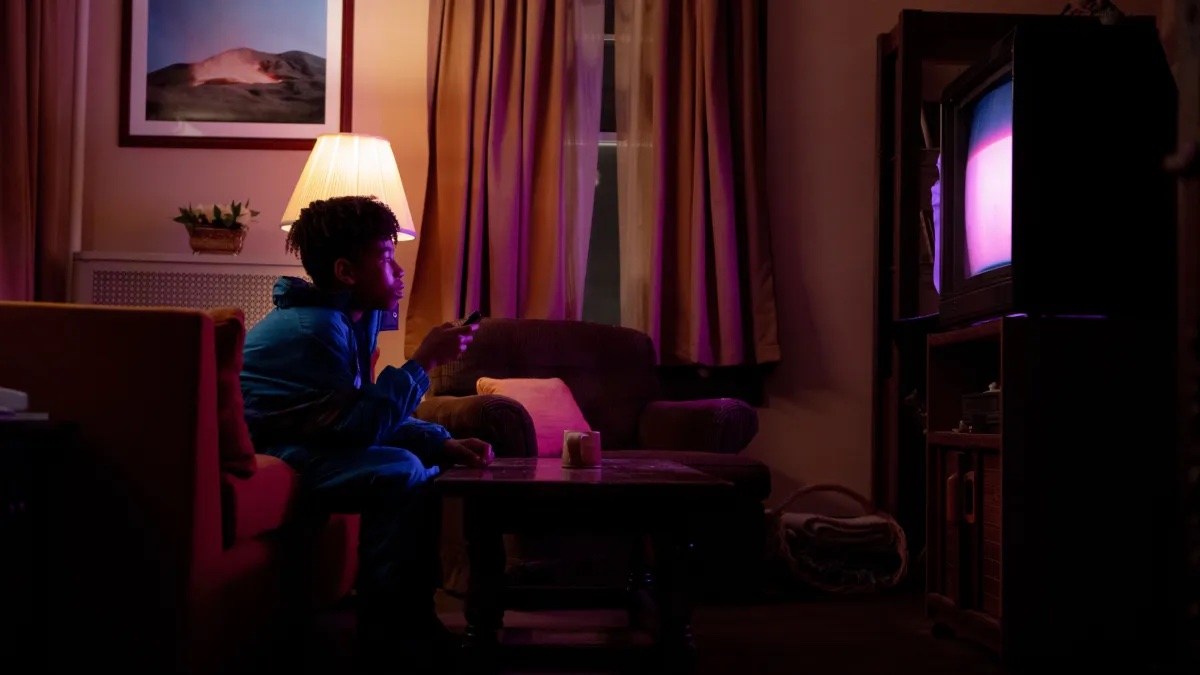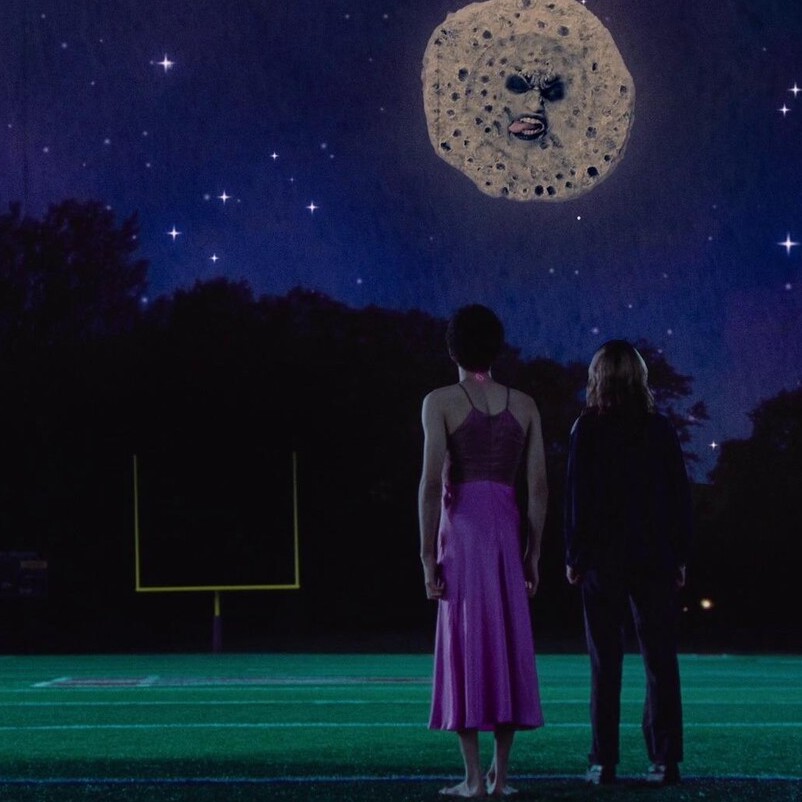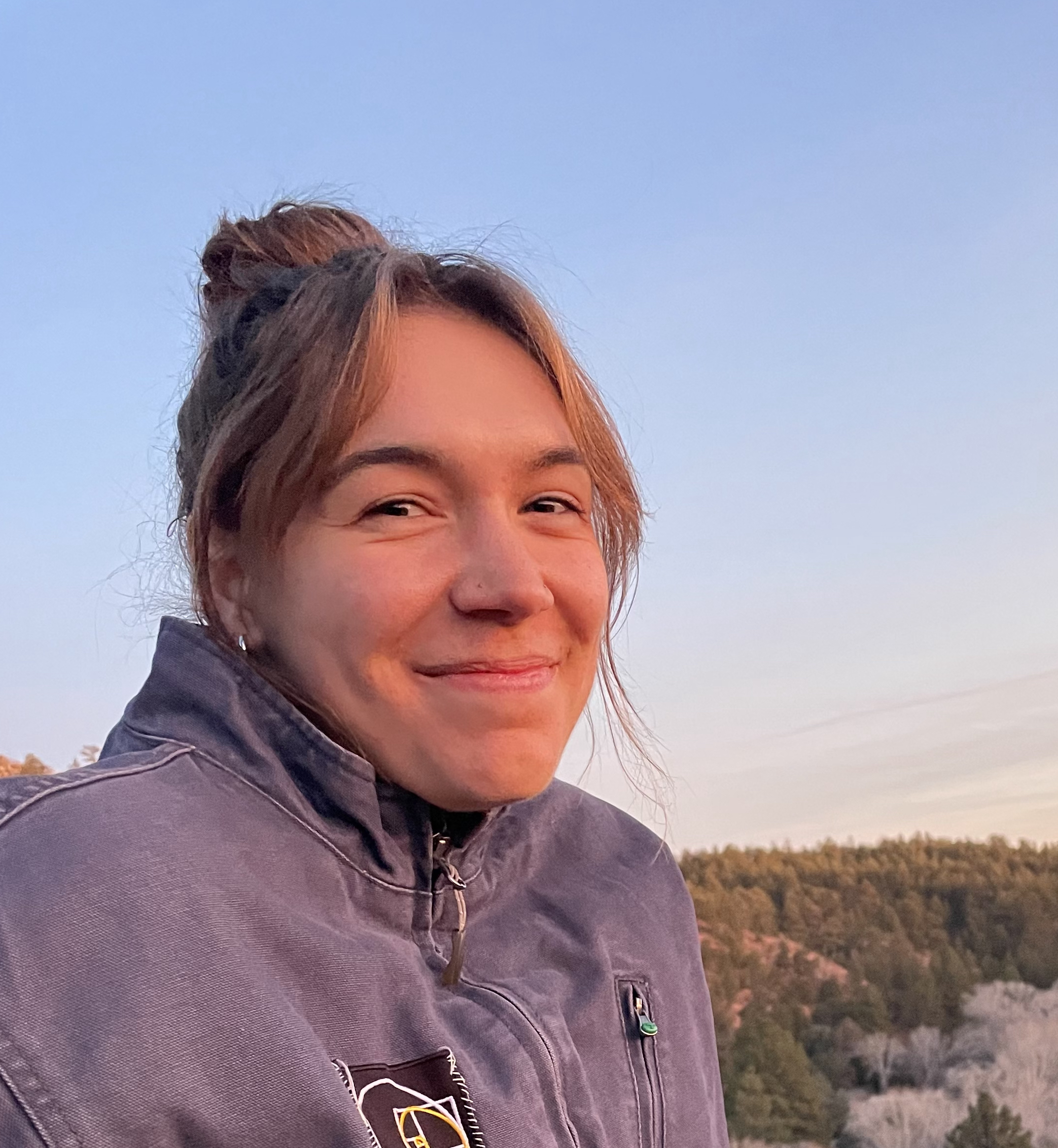I first witnessed Jane Schoenbrun at work in a Poconos love hotel a few years ago. On set for Lucy Dacus’ Night Shift music video, I watched Jane direct the surreal on-screen world of a Wizard of Oz fan convention, with a perpetual smoke haze, witch hats, gay makeouts, and balloon-lined halls.
The shoot itself felt like a dreamscape, with Jane conducting a story that blurred the boundaries between on- and off-camera. Assembling the weirdest, queerest crew of collaborators I’d seen, Jane’s creative world offered late-night hotel lobby conversations of shared hopes, nostalgia, and memories of queer becoming. I admired Jane’s commitment to crafting a professional team that reflected the identities of the people in their personal life. Far from the typical male-dominated experience I’d come to expect on a film set, that weekend felt like its own kind of lullaby, all of us dreaming a shared reality into being.
In 2024, I spoke with Jane around the release of their film, I Saw the TV Glow. We discussed rest, collaboration, dreams as a tool for untethering identity from reality, and Jane’s take on the enduring importance of mixtapes.
***
Maia Sauer: I have this memory of sitting with you on set. You got a call from Alex G as you had a thousand things pulling your attention, but you were so eager to hear his voice. When you hung up, you couldn’t help but wax poetic about how brilliant he is. You were like: “He’s worried that there’s a part of his song that sounds like a fart.”
Jane Schoenbrun: Ha! I remember that part of the song.
MS: You were so excited: “Yes, a fart! He’s a genius! I wouldn’t have thought of a fart, but I love it!” Then you got called back to set. In that moment, it was so clear how completely a fan you are of the people you draw into your work. How do you find these kindred spirits?
JS: I’ve always been a mix-tape maker. I’ve always been a fan. I’ve also always been an artist, but I think pre-transition, putting myself at the center of any process felt incredibly fraught. I hadn't worked through the shame and arrived at a level of self-confidence and belief in my own vision to conceive of that as like a possibility. So the way that I found myself expressing myself creatively was more by being a fan and through the love of other people’s art, whether that’s a mix CD I was making and obsessing over or curation.
The first project I feel I allowed myself to be in the center of, creatively, was an Omnibus film called Collective Unconscious that came out in 2015. I invited five friends who I’d met through my work as a curator and essentially orchestrated this collaborative process, where they each adapted another filmmaker’s dream from the group into a short film. And when we had the five films, we combined it into this very dreamy, strange, oneiric feature. It was very much the same idea of mixtape-making not as just smushing random things together, but as trying to make something beautiful and holistic out of a lot of people’s individual work.
Once I was ready, emotionally, to make my own work, I was taking from that background. I try not to lose that spark of, on a certain level, just wanting to be a fan.
MS: And how do you approach those people you collaborate with?
JS: There’s no way to make a film and have it not be intensely collaborative. I think that to make movies——if you’re at the center of the making——you have to decide your relationship to that fact. One possible option is to be a control freak, in this kind of Kubrick way, and sculpt everything to your incredibly detailed specifications. That’s just not what gets me excited. And I don’t mean that in a binary way, like I think I am a control freak in a lot of ways. When I’m writing the screenplay, editing, creating the blueprints, I’m creating a set structure that play can happen within. But it’s very much beside the point for me to make that play to be something that’s just, like, me, alone.
So, when I invite collaborators in, whether that be someone like Alex who I’m just a huge fan of as a music nerd, or an actor, or a party that I’m trying to throw at a weird love motel in the Poconos, I’m doing myself a creative favor by surrounding myself with people who I’m just going to be excited to capture in some way. I think, in a sense, what you’re doing when you’re on set, in production, making a film, is you’re a curator or conductor of the orchestra. And if the orchestra isn’t filled with people who you think are making the most beautiful individual sounds you can imagine, then why even try?

MS: Is there anyone in particular you’ve had your eye on? A member of a future dream team?
JS: It’s always dependent on the work. The reason I originally reached out to Alex G on World’s Fair is that I was listening to his music as a fan while I was writing. I was thinking about the tone and how he makes his music with this lo-fi quality that feels both incredibly handmade and labored over——DIY but not cheap, and so emotional. The reason the music resonated with me was because it felt like it was made by somebody who was putting so much into the craft, in a way that was very much a “from-my-bedroom-to-yours” energy. This was very inspirational. Every project has its own needs, and I try to let that lead, while also trying to make sure that I’m obsessed with and in love with everything that I’m putting on screen.
In the abstract, there are definitely actors and artists I love and admire. I’m kind of fixated on Courtney Love and always will be. I love Adrienne Lenker, and I’d love to see what she could do in front of a camera. I’ve been saying I really want to reunite Tom Cruise and Nicole Kidman for a movie, because I’m a big Eyes Wide Shut fan. But each project has to determine who you're inviting inside.
MS: I’d love to hear more about your relationship with dreams. I’m thinking of the moment in I Saw the TV Glow when Owen sleeps over at Maddie’s house for the first time to watch a TV show. It’s a drowsy, dreamy opening of trust, like a portal.
JS: This relationship is one I’m super, super interested in. And I’ve interrogated a little bit: why? I remember talking to someone about that film, Collective Unconscious, and sharing this premise of filmmakers adapting each other’s dreams into movies. Whoever I was talking to was like: “That’s the perfect project for three years before you figure out you’re trans.” When reality feels insufficient without much hope of it becoming anything worth emotionally investing in——which was at least my experience of dysphoria and pre-transition——dreams, or any kind of fictional realm, become very enticing, right?
Dreams, and that space where your identity and reality can untether in ways that are seemingly impossible in waking life, is a very alluring space to be exploring pre-transition. And I think my sensitivity to that desire has always been with me, even before I recognized it for what it was. It was such a huge part of what was enticing to me about renting a David Lynch film or a weird, forgotten scary movie from the video store and turning out all the lights in my basement. Or watching SNICK at 9:30pm as a kid and getting transported. Yeah, like you said, like a portal that feels other—where magic exists.
I’m certainly not the first to realize it. I think of Bergman, his filmography, and many others’. Going into a dark space and staring at these images on a screen and existing both in your body but also in relation to what’s happening on that screen is an interesting reproduction of what it feels like to dream. “The Dream Factory,” as Hollywood used to call itself.
MS: As the characters in TV Glow oscillate between vivid dreamstates and visceral waking realities, you manage to continually draw viewers’ attention to the embodiment possible in both of those supposedly different states of wakefulness. I’d love to hear more about the physicality of how you direct.
JS: Physicality and expression and human beings are such a central gift that you have at your disposal when you're making a film. I remember writing that scene, a quiet scene, in the middle of the movie, where they're watching an episode of the show and Maddie just starts crying. That scene is magical because of Jack [Haven] and Jack’s performance. But in understanding what that moment should be, yeah, there was both the logical idea of this goofy TV show on the screen and this outsized emotional reaction that has to stand for something. But also the present-tense joy or embodied enjoyment of emotions on screen——the physicality of it.
MS: What about your own dreams?
JS: I tend not to remember my dreams for months, if not years, at a time. Then, I’ll have a period where I really am remembering. I read a lot of Jung and Freud and have a mixed relationship with dream analysis as a concept. But I did teach myself how to recognize when the dreams are trying to shout something from my subconscious to waking life, and to listen and tune in and try to investigate what the dream iconography is associatively trying to express to me. That usually leads me somewhere, either in my personal or creative life, pretty potently.
I do think my artistic process is a funny mix of conscious brain and subconscious brain. Structurally, to create the blueprint for the film——that work is actually quite literal. It requires math or logic. And that’s obviously not dream logic. But then, I think a lot of what the work gets filled with or is underneath the structure is something else that has to come from a more subconscious place. And that’s actually bled of its power if you “over-logic” it.
MS: You’ve already had a long relationship with film as a medium.
JS: For whatever reason, I zeroed in pretty young——even though I lost the confidence to pursue it, emotionally——on the idea that I should be a filmmaker, if I’m going to be an artist. I think that was a result of film being the preeminent pop cultural means of expressing something cool in the 90s, when I was growing up and going to the video store and renting things. I think it was also the digital camera early-boom. My parents got me a cheap little camcorder and I was getting to play and falling in love early.
MS: Are there other mediums that pull your attention?
JS: Music is something that’s actually something even closer, emotionally, to me. I was talking to Gregg Araki about this——one of my favorite filmmakers. We both had the same sort of relationship, of maybe loving music or admiring musicians more than the emotional impact of film, to the point that we were both like: “if either of us had musical talent or could work in that medium...” We make films because we can’t do that. But I think I’m curious to try it and fail in an interesting way.
I wrote my first novel last year. I gave myself this gift after finishing TV Glow of an artistic process that could just be me at my kitchen table everyday. I had this big idea for something that I knew wasn’t going to fit in a movie and that I feared if I tried to pursue it in television would collapse into itself. I kind of obsessively created this world in the form of a book. Having that level of singular control over all of the elements that go into making something was really pleasurable.
I think there’s always a danger, regardless of whether you’re switching mediums or working within the same medium. If you’re just starting to repeat yourself or not adding new challenges into the mix, the work probably won’t be as urgent as it once was. Continuing to face and conquer fear in that sense was really nice.
MS: And what does downtime or rest look like for you after a project like TV Glow?
JS: Like what else do I do with my life?
MS: Or, what do you experience after finishing a film of such love and obsession? Do your fascinations keep resurfacing?
JS: There was something comforting about jumping from World’s Fair to TV Glow, where World’s Fair felt like training for TV Glow. I had this erroneous idea that a good body of work starts over every time, and I really don’t think that’s true. I think you start where you left off. Or, in my case, I’m always thinking about the next thing. The body of work is always in conversation with itself. The process becomes informed by what you’re learning: what works and doesn’t or what could work better? What feels like I just scratched the surface? Where could I continue digging myself deeper? I think in that sense, it’s pretty fluid and I haven’t found a way to isolate any given project as its own thing with a distinct beginning and end.
All I’m doing [right now], technically, is just celebrating a finished work. I’m just on the road. I definitely am sneaking away every chance I can, even if just in my brain, to new worlds that are related to the old worlds and continuing a life of making art. I’m pretty certain at this point that a life where I have a healthy, consistent creative practice is my happiest life. Not in terms of how many good films I completed, but getting to do that every day and getting a sense of nourishment from it.
MS: What are those daily practices that nourish you?
JS: It’s been one of my major goals over the last few couple years to figure that out. It’s such a gift that I can. The fact that I don’t have a day job really fucking helps. Needing to have a day job again someday that isn’t getting to make my movies is my biggest fear. I lived that life for a long time, and I feel extremely, extremely lucky in this world where that’s very rare, to have that right now. Within that, I’m trying to zero in on a daily creative practice that leaves me healthy.
In the past, the creative process has been quite manic. Especially for World’s Fair and TV Glow, even though I’d spent years idly wrestling with them, the actual writing process was just me closing the door to my bedroom and coming out two weeks later with a screenplay. A huge part of writing the novel for me was trying to have a consistent, daily writing practice that didn’t also supersede my life. I would wake up and write for three or four hours, then take a long walk and process what I’d written, but also come back to the real world a bit. Then I would hang out with one of my partners or cook dinner or see friends or watch a movie. I don’t know, if I could do that everyday, I think I’d be pretty happy.
There’s something to be said for just living and having life experience. Continuing to change and allowing yourself to change and having an engagement with the real world. Without that, where is the work coming from?
MS: Thanks, Jane. I’m grateful for this conversation, which feels especially meaningful after being a fly on the wall, on set with you and in life.
JS: More than a fly on the wall.



